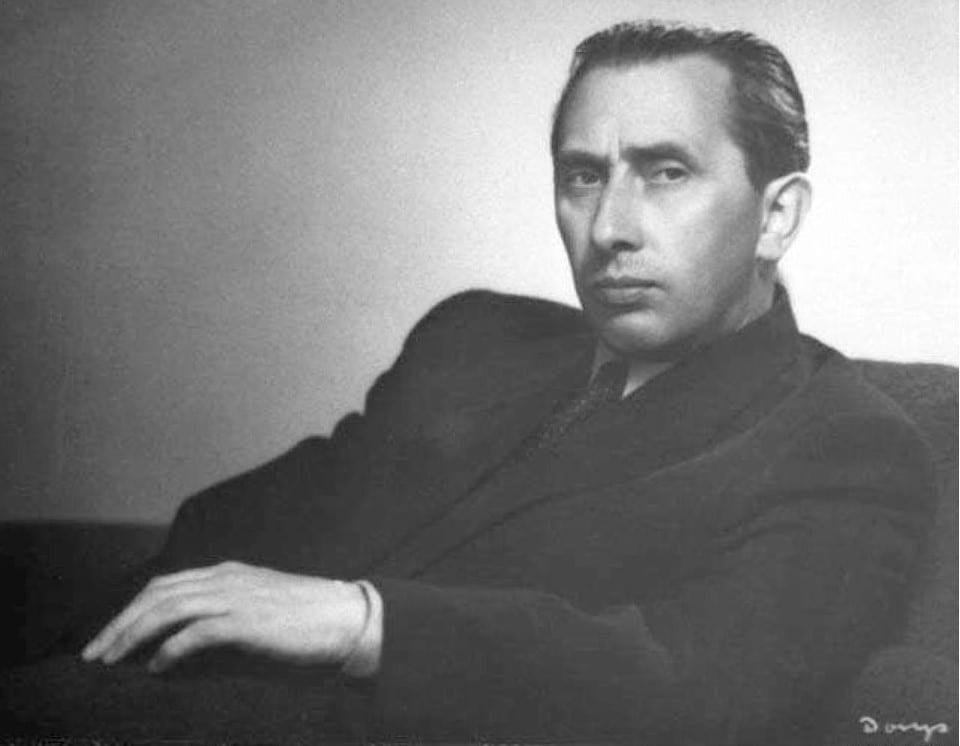24 November 1899, Chojnata — 7 February 1954, Warsaw
Biography

Jan Maklakiewicz was a composer, conductor, teacher, critic and publicist. After initial studies with his father, a country organist, he went to Warsaw to study, first at the Chopin Music School with Michał Marian Biernacki (harmony), Felicjan Szopski (counterpoint) and Leopold Binental (violin). and later at the Conservatory of Music (1922-1925) with Roman Statkowski (composition).
In the years 1926-1927 Maklakiewicz completed studies of composition at the Ecole Normale de Musique in Paris under Paul Dukas. After his return to Poland he devoted his time to composition and organizing of musical events, having founded a number of choral ensembles. He was also engaged in teaching, as well as in musical journalism. In the years 1927-1929 at the Conservatory in Łódź he was in charge of the school choir and lectured on theory of music. From 1929 until his death he taught at the Warsaw Music Conservatory.
In 1932 Maklakiewicz was appointed organist at the Holy Cross Church in Warsaw, where he also worked as a choirmaster. He was also active in musical journalism, writing for the Warsaw Morning Courier during the years 1930-1937. From 1926 until 1939 he also collaborated with the Teatr Polski in Warsaw and was on the staff of Polish Radio from 1937. During World War II Maklakiewicz first worked as a pianist at the Cafe Club and then at the Znachor Cafe in Warsaw, the latter a meeting place for many Polish underground organizations. From 1941 he returned to hide in his birthplace of Chojnata near Skierniewice.
After the Second World War, as a musical publicist Maklakiewicz contributed reviews and articles to newspapers and magazines, such as Daily Morning, Music, Choir and Polish Daily. From 1945-1947 he was director of the Kraków State Philharmonic Orchestra and during the 1947-1948 season, he occupied the same position in Warsaw, also lecturing on composition and instrumentation at the State Higher School of Music. He wrote a great deal of church music in the 1930s and a number of mass songs after the war. Many of his works are based on folk themes. Maklakiewicz received the State Music Award in 1932 for his Cello Concerto, the First Prize at the Kronenberg Competition in 1933 for his violin Concerto No. 1 and, posthumously, the Officer’s Cross of the Order of Poland’s Revival (Polonia Restituta).
Selected Compositions
Orchestral Works and Concertos
Symphonic Variations (1922)
Concerto for Cello and Orchestra on Gregorian themes (1930)
Violin Concerto No. 1 (1930)
Symphonic Tango for orchestra (1931)
Ostatnie werble [symphonic poem commemorating Józef Piłsudski] (1935)
Concert Overture (1939)
Grunwald [symphonic poem] (1939-1944)
Prague Overture (1947)
Grand Waltz and Polka from Łowicz [from the ballet suite The Golden Duck, arr. for wind orchestra by A. Sikorski] (1950)
Violin Concerto No. 2 “Mountaineers” (1952)
Chamber Music
Romans for flute and piano (1927)
Prelude for organ (1927)
Suita huculska for violin and piano (1927)
Triptych for cello and piano (1927)
Reflexions for violin and piano (1929)
Negers Heimweg for violin and piano (1929)
Vocal-Instrumental Music
Les Vierges Aux Crepuscules for 2 mezzo-sopranos, flute, viola and harp (1927)
Symphony No. 2 “Holy Lord” for baritone solo, mixed choir and orchestra (1927)
Concertino quasi una Fantasia for piano, mezzo-soprano and orchestra (1929)
Four Japanese Songs for soprano and orchestra (1929)
Song of our Daily Bread symphonic poem for mixed choir and orchestra (1931)
Polish Mass for mixed choir, soprano or tenor solo and organ (1944)
Four Songs Op. 5 for high voice and orchestra (1946)
Madonnas five songs for soprano and orchestra (1947)
Silesia Works and Sings, folk suite for tenor solo, men’s, women’s and mixed choir with orchestra or piano (1948)
Suite from Łowicz for soprano solo, mixed choir and orchestra (1948)
Zabrze cantata for 4-part men’s or mixed choir and symphony orchestra (1949)
Vocal-Instrumental Music (undated)
Christmas Carols, for mixed choir and organ:
After the Star, text by Stanisław Młodożeniec
When Christ is Born
Our Lady
He is Lying in the Manger
Bow to Jesus, text by B.S. Kossuth
God is Born
The Virgin Mary’s Cradle Song
At Our Lord’s Nativity
Hush Baby, Little Jesus
The Star is Shining Above the Stable, text by B.S. Kossuth
Little Jesus
Our Lady Lulled Her Son, text by Hanna Jarowicz
People’s Hearts Rejoice, text by Hanna Jarowicz
Elegy after Roman Statkowski’s Death for 4-part mixed choir and organ
Our Lady [song from the 17th century] for mixed or 4-part men’s choir and organ
Choral Music a Capella
Five Folk Songs for mixed choir (1929)
The Little Geese were Flying [Kurpie region melody] for mixed choir (1929)
Three Strings for 4-part men’s choir (1935)
Cradle Song for 4-part men’s choir [two different versions] (1946)
Zabrze for mixed choir (1949)
Choral Music a Cappella (undated)
Christmas Carols
Harnas from the Beskid Mountains for mixed choir, texts by J. Reimschussel
Kashubian Bugle Call, for 3-part mixed choir, texts by Hanna Parysiewicz
Song of the Polish Sea for mixed choir, to the words by A. Bogusławski
Two Winds for mixed choir, texts by Julian Tuwim
Songs for Voice and Piano
Du bist wie Blume Op. 23, text by Heinrich Heine (1928)
Song of the Mayor’s Daughter Op. 21, text by Jan Kasprowicz (1928)
Cradle Song [also arr. for voice and mandolin by E. Ciuksza] (1946)
Stage Works
Shiwohumi [ballet] (1934)
Cagliostro in Warsaw [ballet in 3 scenes] (1938)
The Golden Duck [ballet in 5 scenes] (1950)
“We must demand this one thing: that ‘Polish character’ would resonate, and this is because more and more often our output is influenced by international elements.”
[Maklakiewicz about Palester in 1936. Quoted in Pokolenie kompozytorskie “debiut 1930” by Rafał Ciesielski]
“A trend that does not impart positive values on our culture…”
[Maklakiewicz about serialism in music in 1931. Quoted in Pokolenie kompozytorskie “debiut 1930” by Rafał Ciesielski]
Page updated on 9 April 2018